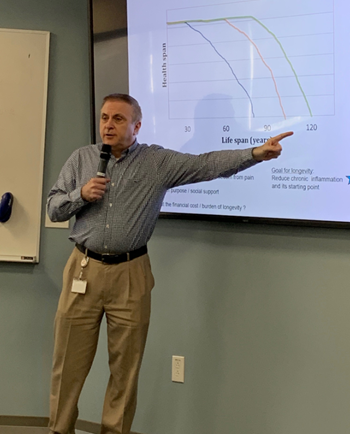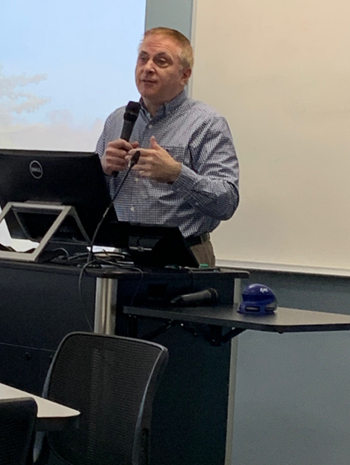Want to Live Longer? Dr. Pelino has Some Suggestions
In the mid-1990s, when Dr. Carlo Pelino was working at John F. Kennedy Memorial Hospital in Philadelphia, a colleague who was a primary care physician returning from a conference had some interesting information to share: That because of genetics, people could live healthy lifestyles past the age of 90.
That idea intrigued Dr. Pelino, so for the past 20-plus years, he’s accumulated a combination of factors he believes will help patients not only live longer, but also have a good quality of life at an advanced age.
 Dr. Pelino, chief of The Eye Institute's Chestnut Hill location, recently presented an on-campus lecture titled “Longevity through the EYE of the Beholder,” which explored the nature (genetics) versus nurture (the role of the environment) debate in longevity. In it he described both lifespan and health span and correlated ocular findings of both. The lecture described the definition of metabolic syndrome, specific genes for longevity and a review of the necessary life steps needed to achieve longevity in order to avoid cardiovascular, neuro-degenerative and cancer risk factors.
Dr. Pelino, chief of The Eye Institute's Chestnut Hill location, recently presented an on-campus lecture titled “Longevity through the EYE of the Beholder,” which explored the nature (genetics) versus nurture (the role of the environment) debate in longevity. In it he described both lifespan and health span and correlated ocular findings of both. The lecture described the definition of metabolic syndrome, specific genes for longevity and a review of the necessary life steps needed to achieve longevity in order to avoid cardiovascular, neuro-degenerative and cancer risk factors.
“If you look at longevity studies, we have centenarians over 100 and we have super-centenarians over the age of 110. And, the key is, do you want those last years of your life to be bed-ridden?” said Dr. Pelino to the faculty and students who attended the presentation. “What I think is interesting, is that most people always look at the x-axis and they just say how long am I going to live? That's your lifespan. But you have to include the y-axis, and incorporate health span along with lifespan. And, if you look at what health span means, there’s no sense to live to be 120 if you don’t have cognitive ability, physical ability, tolerance to certain environmental things and a sense of purpose and support.”
So what are the keys to living longer? According to Dr. Pelino, one is to reduce inflammation or try to delay inflammation until later in life. “Those of you that are active swimmers, those who love to run, eat healthy with a proper diet and don’t have a lot of stress, you have done well,” he said. “Because what you’ve done, you’ve reduced inflammation.” For individuals who die in their 70s or early 80s, most chronic inflammation starts around 50 years of age, according to Dr. Pelino.
Another key to longevity is to avoid metabolic syndrome – a cluster of conditions that occur together to increase the risk of heart disease, stroke, peripheral neuropathy and kidney disease. The condition includes increased blood pressure, high blood sugar, and excess body fat found around the organs or subcutaneous tissue and abnormal cholesterol or triglyceride levels.
Why do we age? “It’s not all about the genetics that you’re born with that actually determine your longevity,” said Dr. Pelino. “Actually, it’s your epigenetics – the external and internal environments turning on a gene or turning it off. And, the metabolic syndrome could be the cause of some of the epigenetic factors to turn on or turn off genes for longevity.”
 What can be done, though, to create a phenotype when an individual doesn’t have the genotype of a centenarian or a super-centenarian? Dr. Pelino suggests there are five things to pay attention to increase one’s longevity. They include: proper eating, exercise physiology, nutrients (drugs and supplements), sleep physiology (duration, depth, continuity and regularity of sleep) and learned and unlearned behaviors, like chronic stress and smoking.
What can be done, though, to create a phenotype when an individual doesn’t have the genotype of a centenarian or a super-centenarian? Dr. Pelino suggests there are five things to pay attention to increase one’s longevity. They include: proper eating, exercise physiology, nutrients (drugs and supplements), sleep physiology (duration, depth, continuity and regularity of sleep) and learned and unlearned behaviors, like chronic stress and smoking.
When trying to reach your ideal body mass index – trying to lose weight – it’s not so much the diet that’s picked as it is caloric restriction. “You want as low of an amount of calories daily as possible. The more calories you take in - carbohydrates and protein - the more the epigenetic factors methylate the DNA,” he said. “And, exercise is huge, not because you are going to lose weight and gain muscle, but because it gives the sugar someplace to go for usage by the body, mainly the muscle and brain. It gives the sugar someplace to be utilized other than stored as fat.”
Dr. Pelino also noted there are drugs available that can keep you alive longer, including Metformin, Rapamycin, blood pressure medicines and cholesterol medicines. “What I think is being found here is that these are good meds at low doses started later in life,” he said. “These are good meds to study in the future for longevity purposes.”
But Dr. Pelino stressed there are things you can do now that will help you live longer.
“Remember, start your chronic inflammation later in life,” he said. “And, that epigenetics is the key to longevity, along with genetics and a proper lifestyle in moderation. So take care of yourself.”